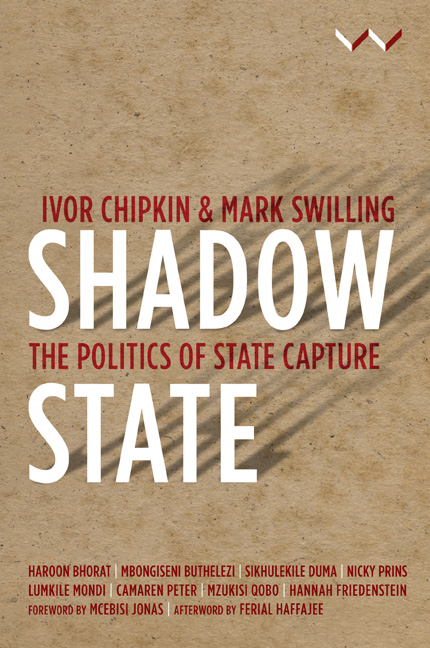Book contents
- Frontmatter
- Contents
- List of figures and tables
- Acronyms and abbreviations
- Key terms
- Acknowledgements
- Foreword
- Prologue
- Introduction
- Chapter 1 Structuring the Capture of the State
- Chapter 2 The Politics of Betrayal
- Chapter 3 Power, Authority and Audacity: How the Shadow State Was Built
- Chapter 4 Repurposing Governance
- Chapter 5 Conclusion
- Afterword
- Contributors
- Index
Chapter 4 - Repurposing Governance
Published online by Cambridge University Press: 17 May 2019
- Frontmatter
- Contents
- List of figures and tables
- Acronyms and abbreviations
- Key terms
- Acknowledgements
- Foreword
- Prologue
- Introduction
- Chapter 1 Structuring the Capture of the State
- Chapter 2 The Politics of Betrayal
- Chapter 3 Power, Authority and Audacity: How the Shadow State Was Built
- Chapter 4 Repurposing Governance
- Chapter 5 Conclusion
- Afterword
- Contributors
- Index
Summary
From conviction to ideology
The Polokwane revolt in the ANC was informed by a conviction that economic transformation as pursued after 1994 had produced an anomaly, if not a perversion: a small black elite beholden to white corporate elites, a vulnerable and over-indebted black middle class and a large African majority condemned to unemployment and dependent on welfare handouts to survive. The rise in the Gini coefficient between 1994 and 2009 lends credence to this view.
Most people in the ANC and the Tripartite Alliance believe that the RDP was jettisoned when the Gear strategy was adopted in 1996. ‘Few,’ noted Ben Turok in 2008, ‘seem to have accepted arguments such as those advanced by Minister of Finance Trevor Manuel, immediately before the [Polokwane] Conference, that “Gear was the ANC government's macro-economic programme to implement the RDP”’. Gear was widely slated as a self-imposed programme of structural adjustment. As a Cosatu briefing document from 2002 put it: ‘The movement … sharply warned against the danger of promoting the interests of a new elite over and above that of the majority who stood to benefit from national liberation.’
The repudiation of the Thabo Mbeki administration at Polokwane was absolute. All six of the most senior ANC and government officials lost their positions. After Polokwane the earliest expressions of this conviction as a set of policy proposals came from the ANCYL. Articulating a vision of ‘Economic freedom in our lifetime’ – an adaptation of the famous ANC slogan from the 1940s, ‘Freedom in our lifetime’ – Julius Malema, then president of the Youth League, recalled the Freedom Charter's categorical imperative: ‘The national wealth of our country, the heritage of South Africans, shall be restored to the people.’ At the Youth League's National General Council in August 2010 he explained that ‘Nationalisation of mines is but one of the components of realising economic freedom in our lifetime, and we should never compromise on that principle’.
Nationalisation was not the only alternative to the market-friendly approaches pursued after 1994. Cosatu, for example, was exploring how the economy could be reconstructed using an investment strategy that differentiated between six types of capital: publicly owned fiscal resources, publicly owned resources in the hands of parastatals, public-sector financial institutions, socially controlled resources, retirement funds and private capital.
- Type
- Chapter
- Information
- Shadow StateThe Politics of State Capture, pp. 101 - 132Publisher: Wits University PressPrint publication year: 2018

